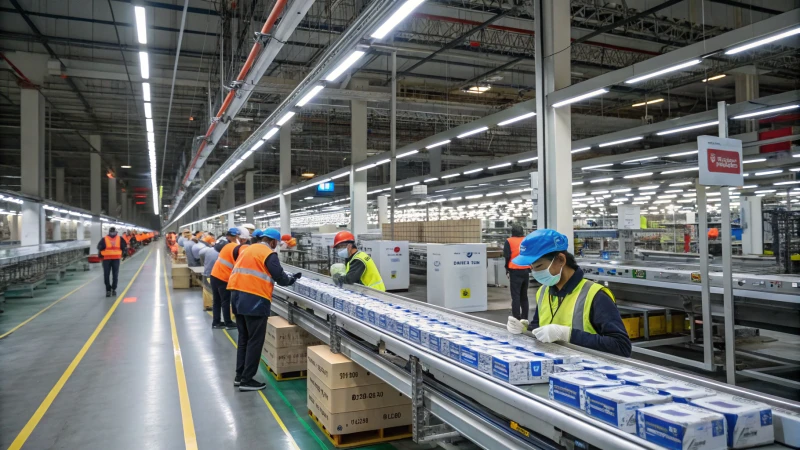
Ever wondered why some business relationships stand the test of time while others fizzle out?
Regular factory auditing is essential for sustaining long-term B2B partnerships because it ensures consistent quality, compliance with industry standards, and risk mitigation. These audits verify adherence to standards and highlight areas for improvement, boosting efficiency and trust.
Reflecting on my journey in business development, I've learned that regular factory audits are like the unsung heroes of B2B partnerships. They might not be glamorous, but they are vital for building trust and reliability. These audits are not just about checking boxes; they are a chance to proactively tackle potential risks and keep our operations running smoothly. In this article, I'll share insights into the deep advantages of regular auditing and best practices I've found effective in nurturing partnerships that last.
Factory audits ensure compliance with industry standards.True
Regular audits verify adherence to industry norms, enhancing trust.
Skipping factory audits increases operational efficiency.False
Audits identify improvement areas, boosting efficiency and reliability.
How Do Factory Audits Enhance Product Quality and Compliance?
Imagine knowing that every product you use meets high standards, thanks to rigorous factory audits. Sounds reassuring, right?
Factory audits elevate product quality and compliance by providing a thorough review of manufacturing processes, identifying risks, ensuring adherence to standards, and promoting continuous improvement. This leads to superior quality products and consistent compliance.

The Role of Factory Audits in Quality Assurance
I remember the first time I truly understood the impact of factory audits. I was visiting a supplier's factory overseas, and witnessing the audit process firsthand was eye-opening. The auditors meticulously inspected every step of the production line, from the raw materials to the final product packaging. It wasn't just about finding faults; it was about ensuring excellence.
Through these regular inspections, discrepancies in production methods or materials used are pinpointed. This ensures that each product meets established standards. The process involves:
- Evaluating Manufacturing Processes: Confirming that production techniques align with quality benchmarks.
- Identifying Non-Compliance: Detecting deviations from regulatory requirements early.
- Implementing Corrective Measures: Offering recommendations for improvements.
By focusing on these elements, I've seen businesses maintain consistent quality control1 across all production lines.
| Key Audit Aspects | Impact on Quality |
|---|---|
| Process Checks | Uniformity |
| Material Testing | Reliability |
| Documentation | Traceability |
Enhancing Compliance through Regular Audits
Compliance is another crucial pillar supported by factory audits. Regular evaluations ensure that companies adhere to industry standards2, labor laws, and environmental regulations. This includes:
- Legal Compliance Checks: Ensuring products meet local and international laws.
- Labor Standards Verification: Confirming fair labor practices are upheld.
- Environmental Regulations: Assessing the impact of manufacturing processes on the environment.
Such scrutiny not only prevents legal issues but also bolsters a company's reputation for ethical practices. I’ve seen firsthand how this proactive approach can help avoid costly fines and preserve brand integrity.
Driving Continuous Improvement with Audits
Factory audits are more than just problem-finders; they’re pivotal in fostering a culture of continuous improvement. By highlighting inefficiencies or waste, audits can drive:
- Process Optimization: Streamlining operations to enhance efficiency.
- Innovation Opportunities: Identifying new ways to improve product design or manufacturing.
- Resource Management: Better allocation of resources to reduce costs.
Incorporating regular factory audits into operational strategies allows companies to remain competitive and responsive to market demands3. This alignment with evolving standards ensures long-term success and sustainability.
Reflecting on my experiences with factory audits, it’s clear they’re indispensable for anyone serious about maintaining top-notch quality and compliance.
Factory audits ensure legal compliance in manufacturing.True
Audits verify adherence to laws, preventing legal issues.
Factory audits do not affect product quality.False
Audits enhance quality by identifying and correcting defects.
Why Shouldn't We Neglect Regular Factory Audits?
Have you ever skipped a factory audit? Let me tell you why that's a risky move.
Skipping regular factory audits can lead to serious problems like poor product quality, regulatory non-compliance, increased liability, and a tarnished brand reputation. Regular audits are crucial to ensure these standards are consistently met and to prevent these significant risks.

I remember the first time I realized the importance of regular audits. It was a costly lesson. Our business faced a major hiccup when a batch of products didn’t meet our quality standards, leading to unhappy customers and a frantic scramble to fix the issue. Had we not overlooked the audit schedule, we might have avoided this mess altogether.
Impact on Product Quality
Neglecting audits can directly hit product quality. I’ve seen how even minor unchecked production hiccups can escalate into major defects. Customers notice, and believe me, once their trust is shaken, it’s an uphill battle to regain it. Regular audits are like health check-ups—they help keep everything in line and prevent small issues from snowballing.
Regular audits ensure that quality control measures4 are maintained, preventing these costly issues.
Compliance and Regulatory Risks
There was this one time when ignoring an audit almost cost us dearly in fines and legal troubles. Staying compliant isn’t just about avoiding penalties; it’s about keeping our doors open and our operations running smoothly. Regular audits act as our safety net, ensuring we adhere to industry regulations5 and avoid those sleepless nights worrying about potential shutdowns.
Increased Liability and Insurance Costs
I learned that ignoring audits can also mean higher insurance premiums. That was a hard pill to swallow. With undetected issues brewing, our risk level shot up, making us less attractive to insurers. Keeping up with audits shows we’re responsible and can even help us negotiate better insurance costs6.
Damage to Brand Reputation
A single recall due to neglected audits hit us hard in the reputation department. Trust takes years to build but seconds to destroy. Engaging in regular audits ensures we remain transparent and accountable, which is crucial for maintaining a solid reputation7 with our customers.
| Potential Risks | Consequences |
|---|---|
| Quality Issues | Customer dissatisfaction, loss of business |
| Compliance Failures | Fines, legal actions, factory shutdowns |
| Increased Liability | Higher insurance premiums |
| Reputational Damage | Loss of customer trust |
Operational Inefficiencies
Finally, without the insights from audits, we risked being stuck in inefficient practices that drained resources and slashed profits. It’s amazing what fresh eyes can spot. Audits helped us pinpoint areas where we could enhance productivity8, saving us time and money in the long run.
Reflecting on these experiences has cemented the role of regular audits in our operations. They’re not just a checkbox exercise—they’re integral to our success.
Skipping audits increases product defect rates.True
Regular audits ensure quality control, reducing defects.
Neglecting audits has no effect on insurance costs.False
Lack of audits can raise insurance premiums due to higher risks.
How Do Factory Audits Spark Innovation and Boost Efficiency?
Factory audits are more than just checklists—they're the unsung heroes that spark innovation and streamline efficiency.
Factory audits foster innovation and efficiency by uncovering hidden inefficiencies, ensuring compliance, and promoting transparency. These evaluations refine operational practices, boost product quality, and drive continuous improvement, making them indispensable tools for modern manufacturing.

Uncovering Inefficiencies
I remember the first time I walked through a bustling factory floor during an audit. At first glance, everything seemed to be running smoothly. But as we dug deeper, examining each production line, it became clear that there were subtle bottlenecks slowing everything down. These audits work like a magnifying glass, highlighting inefficiencies that might slip under the radar in the daily hustle. With this newfound clarity, we were able to make data-driven decisions that significantly enhanced our operational efficiency9.
Ensuring Compliance and Quality
Regular audits have always been my go-to strategy for ensuring that we're not just checking boxes for compliance but genuinely upholding labor standards and environmental regulations. This commitment isn't just about avoiding legal issues—it's about pride in our product quality. High compliance levels have saved us from potential product recalls10 and helped maintain our brand's reputation.
| Compliance Area | Example Benefits |
|---|---|
| Labor Standards | Improved worker satisfaction |
| Environmental Laws | Reduced waste and pollution |
| Safety Regulations | Decreased workplace accidents |
Driving Innovation Through Feedback
The feedback I receive from audits is invaluable. It's like having a seasoned mentor point out areas ripe for innovation. This guidance has directly influenced our research and development efforts, helping us design more efficient technologies. Each piece of feedback acts like a stepping stone towards better product designs11 that cater to evolving market demands.
Fostering Transparency
Transparency through regular audits isn't just a buzzword; it's a cornerstone of building trust with stakeholders. By sharing audit results openly, we foster a culture of collaboration and shared learning. I've seen firsthand how discussing these findings with suppliers can lead to joint initiatives aimed at improving supply chain efficiency12. This level of openness not only builds trust but also paves the way for innovative problem-solving.
Factory audits reveal hidden inefficiencies.True
Audits analyze production lines, identifying bottlenecks and resource waste.
Audits decrease the need for product recalls.True
Ensuring compliance helps maintain quality, reducing recall risks.
What Are the Best Practices for Implementing Effective Factory Audits?
When I first delved into factory audits, I was blown away by how much there was to learn! Let’s explore the best practices that make these audits truly effective.
Effective factory audits hinge on detailed planning, skilled auditors, and transparent communication. Using a comprehensive checklist, ensuring auditor independence, and fostering open dialogue are essential for meaningful insights and continuous improvement.

Importance of Planning and Preparation
The cornerstone of any successful audit is meticulous planning. I remember my first audit like it was yesterday; overwhelmed by the sheer volume of details to consider. The key to managing this complexity is defining the scope, objectives, and criteria upfront.
| Key Elements | Description |
|---|---|
| Scope | Define the boundaries of the audit to focus on critical areas. |
| Objectives | Set clear goals to measure success. |
| Criteria | Establish benchmarks based on standards and regulations. |
Having a detailed checklist keeps everything on track, from quality control to compliance and operational efficiency. Trust me, allocating time for preparation and pre-audit meetings can be a game-changer.
Selecting and Training Skilled Auditors
Choosing the right auditors is like picking the perfect team for a championship game. They need to know the industry inside out and remain objective throughout the process. Regular training enhances their ability to identify potential issues that others might miss.
Providing access to past audit reports13 is invaluable for understanding recurring patterns and areas needing attention.
Utilizing Technology in Audits
In today's digital age, incorporating technology is not just an option—it's a necessity. Tools such as audit management software14 have revolutionized how we collect and analyze data, making it easier to track compliance and performance over time.
Imagine using drones or sensors during large-scale audits; they gather real-time data efficiently without missing a beat.
Ensuring Open Communication
From my experience, nothing beats open communication—it’s the glue that holds everything together. Transparent communication between auditors and staff fosters a collaborative environment.
Conduct pre-audit briefings to clarify expectations and procedures. Afterward, discussing findings constructively with the team helps us implement improvements swiftly.
Continuous Improvement through Feedback
I’ve learned that effective audits shouldn't end with a report. Establishing a feedback loop where insights from audits inform future practices and policies is crucial.
Regularly reviewing audit outcomes helps refine criteria and processes, driving continuous improvement and innovation across the organization.
Meticulous planning is essential for successful factory audits.True
Planning defines scope, objectives, and criteria, ensuring thorough audits.
Drones are ineffective in large-scale factory audits.False
Drones efficiently gather real-time data, enhancing audit effectiveness.
Conclusion
Regular factory auditing is vital for sustaining long-term B2B partnerships by ensuring product quality, compliance, risk mitigation, and fostering trust through transparency and continuous improvement.
Understand the significant role quality control plays in ensuring consistent product quality and improving manufacturing efficiency. ↩
Explore various industry standards crucial for maintaining compliance in manufacturing processes. ↩
Learn how adapting to market demands through audits can enhance competitiveness and sustainability. ↩
Explore best practices for maintaining high product quality through effective control measures. ↩
Understand the importance of compliance with industry regulations in factory settings. ↩
Discover how consistent audits can influence factory insurance premiums. ↩
Learn about the effects of negative publicity on a brand's image. ↩
Find out how regular audits contribute to increased operational efficiency. ↩
Exploring this link reveals how detailed audits can uncover hidden inefficiencies, driving improvements in operational processes. ↩
This link provides insights into how strict compliance reduces product recalls, enhancing customer trust and brand image. ↩
By following this link, readers can learn how audit feedback influences innovative product designs to meet market demands. ↩
Discover how sharing audit findings with suppliers fosters transparency, leading to enhanced supply chain collaboration and efficiency. ↩
Explore this link for comprehensive factory audit checklists that ensure thorough evaluations of quality control, compliance, and efficiency. ↩
Discover how audit management software enhances data collection and compliance tracking in factory audits for better efficiency. ↩






